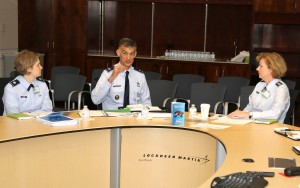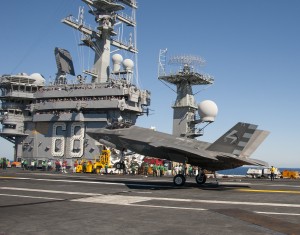2015-08-03 According to an August 3, 2015, DoD story written by Thomas Perry, the role of the Defense Contract Management Agency team working on the F-35 roll out was the focus of attention.
FORT WORTH, Texas – “First off I would like to thank Col. Staphol, Col. Stathlo, Col. Staful … Snuffy, for allowing me the privilege of recognizing his folks,” said Air Force Lt. Gen. Wendy Masiello, Defense Contract Management Agency director. “Every time we walk down the hallway he says, ‘I love these guys; I love these guys.’ And, I know you know that it’s evident in everything he says and does.”
Air Force Col. Alex Stathopoulos, the agency’s Lockheed Martin Fort Worth commander, is referred to as “Snuffy” by many in his command — a term of both respect and convenience. As demonstrated above, the energetic leader takes great pride in his team and isn’t shy about saying so. Born to an Air Force father, the Port Jefferson, New York, native discovered at an early age that a military life reliant on service before self and teamwork suited his nature.
His current team plays the vital Department of Defense role of administering contracts for the F-35 Lightning II Joint Strike Fighter, which is the department’s largest and most ambitious weapon system program ever in terms of total cost, number of customers, partners and capabilities.

As the backbone of U.S. air combat superiority for generations to come, the F-35 fifth generation multi-role, multi-service, single seat and single engine strike fighter features three variants and a massive supply chain involving companies from across the globe. Its current customer list includes three U.S. services, eight international partners and three foreign military sales countries.
Unprecedented in size and complexity, the global program invites criticism as budgets are announced, domestic and international pressures build, and deadlines approach. However, understanding today’s resource-constrained world, the program actively leverages key global resources to ensure economies of scale, facilitate industrial partnerships, advance science and technology worldwide, and achieve critical cost sharing. Undaunted by the program’s scope, Stathopoulos, who said making a difference in the F-35 program is a career highlight, welcomes the challenge.
“The F-35 program is the major leagues, and pressure is part of the job when you’re in the majors,” said Stathopoulos, whose F-35 familiarity stems from two previous program assignments. “One of the things that is very important is working with the press to ensure the facts get out. The American people have a stake in the program and the press has a responsibility to get the word out. I enjoy the press. The challenge, on a program like F-35, is to ensure people are getting the facts. Sometimes journalists can be a bit zealous in getting something out there, and it may contain inaccuracies. I enjoy bringing clarity and accuracy to the dialogue.”
When he first received orders to Fort Worth, Stathopoulos said he was “enthusiastic about working inside industry as a part of DCMA, an organization supported by talented people who truly make a difference for the warfighter and the taxpayer.”
His excitement only grew as he developed an appreciation for his Fort Worth team members and the program’s customers.
“The men and women here have great passion for what they do,” said the 23-year veteran. “They come to work every day thinking of our customers and trying to make life better or easier for them. Our customers deserve our best, and we focus on trying our best. Our customers are the program office, the operational units we deliver aircraft and systems to, the taxpayer, and even DCMA. We have great customers.”
In the coming years, the F-35 program will sustain a production build-up. In 2015, Lockheed Martin is working to deliver 45 aircraft. Projections forecast an annual production rate of 170 aircraft by 2020.
“It is going to be big,” said Stathopoulos. “From a DCMA perspective, I am excited about our growth as it represents the potential for innovation and fresh ideas. As we grow, we have opportunities to really improve our processes with diversity in our people, perspectives, experiences and ways of doing business.”
Even as the program enters an exciting evolution, the realities of military service mean Stathopoulos will eventually move on to a new assignment. He is confident in the F-35’s future however, and believes communication will be crucial moving forward.

“It is always important for DCMA to remember our customers,” he said. “We need to communicate with our program offices, our operational users and our industrial counterparts candidly and often. When you provide services — such as we do — you need to keep your customers front and center. The work we do touches the world’s flight lines and the American taxpayers. We support both.”
His family’s support network has included the Air Force for decades, and Stathopoulos credits the service for tremendous and rewarding life opportunities. His father still tells his “Air Force stories,” and remembers his service fondly.
“Snuffy” will someday join him, sharing recollections of glory days when he spent time on the F-35 program, which he predicts will be dominating the global skies. More than likely, the anecdotes will focus on his team and the difference they made together. “It is amazingly rewarding to come to work every day and work with these professionals to make such an ambitious and important program a reality. It is truly a highlight I enjoy every day.”
As of July 1, the F-35 Lightning II has surpassed 36,000 combined flight hours between F-35 military fleet aircraft and System Development and Demonstration test aircraft.
The F-35 Operational Fleet features 112 aircraft (105 U.S. and seven international partner aircraft) and the F-35 Test Fleet features 18 aircraft (six F-35A, seven F-35B, and five F-35C).
Currently, 172 F-35 pilots and 1,810 maintainers from U.S. Air Force, Navy and Marine Corps, the Netherlands and the United Kingdom have been qualified through the aircraft’s training system.
The F-35 has completed multiple weapons tests as well as F-35B and F-35C first-life durability testing.
Additionally, the program has conducted two F-35B developmental test shipboard trials aboard the USS WASP; the Marine Corps conducted its F-35B first operational test aboard USS Wasp in May 2015; and the F-35C will conduct its second developmental test event in late 2015.

